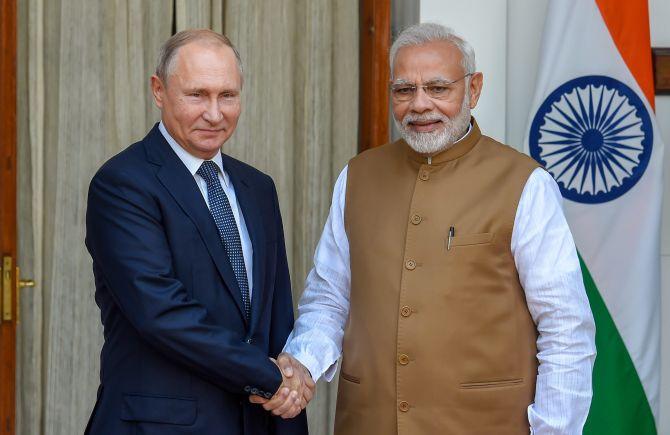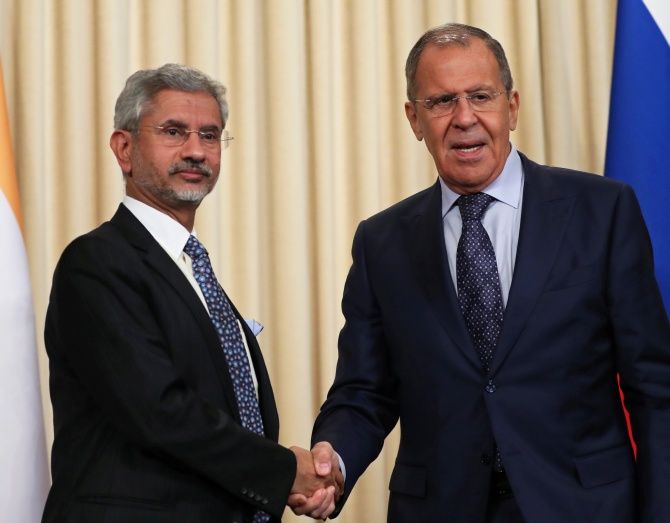How far can Modi push matters in India-Russia relations, asks Ambassador M K Bhadrakumar.

The expected signing (external link)of a logistics agreement between India and Russia is a notable happening during Prime Minister Narendra Modi's visit to Vladivostok on September 4-6.
When such an agreement was concluded with the US in 2016 -- the first-ever such agreement with any foreign power -- eyebrows were raised within India not only among the Left but strategic analysts and think-tankers as well as right-wingers.
But today, the Americans themselves would have mixed feelings. The 2016 agreement was integral to the US strategy to develop 'inter-operability' between the Indian and American militaries, which of course was a template of the US agenda to induct India as a key regional ally.
Now, when a partner trivialises what was meant to have been a privileged intercourse, it is humiliating to self-esteem.
Simply put, India has bracketed the US with Russia, a world power Pentagon branded as 'revisionist' and 'Revitalised Malign Actor.'
Both the US and Russian armed forces can now access stockpiles of weaponry on Indian soil and service their ships and replenish their supplies without money changing hands -- while remaining implacable rivals on the global plane. It signals the multipolarity in the world order.
Conceivably, this has been a Russian initiative, since a touch of the brooding Russian humour is unmistakeable there. However, the proposition is intriguing, too.
The Russians are thrilled with Modi's extraordinary success in reversing the steady atrophy of the Russian-Indian 'special and privileged strategic partnership' through the past 10 to 15 years, especially since the US-Indian nuclear deal was negotiated.
Modi is now resetting the compass for a qualitatively new relationship for the 21st century. His thumping victory in the 2019 poll delighted the Kremlin.
Historically speaking, the people-to-people relationship used to be the bedrock of the Soviet-Indian friendship and cooperation, while the Indian elite remained largely pro-Western. But the calculus has changed dramatically.
We may no longer hear the roar of the Russian-Indian friendship in the mohalla and inner cities of the Hindi heartland, but for the first time, perhaps, the Kremlin is dealing with an Indian leader who is unabashedly 'pro-Russia' -- and is willing to be perceived that way.
Much of this role reversal, is attributable to Modi's personal friendship with Russian President Vladimir Putin -- who is hosting Modi to a one-to-one private dinner at Vladivostok.
A bonding at a deeply personal level never before existed between Soviet Russia's leaders and their Indian counterparts, starting from the halcyon days of Nikita Khrushchev and Jawaharlal Nehru.
On Modi's part, there is admiration for the surge of Russian power on the world stage under Putin's leadership.
Modi is even more enchanted by the surge of Russian national pride and unity under Putin -- and is keenly aware of the astute use the Russian leader makes of religion and symbols of cultural nationalism to create a new narrative for the born-again nation.
Possibly, unspoken yearnings for a similar trajectory for India draws Modi to Putin. We may never know.
Suffice to say, when it comes to the Russian-Indian logistics agreement, Moscow took the initiative with all confidence that such a template can provide purposeful underpinning to the strategic partnership through the foreseeable period ahead under Modi's stewardship.
Of course, not all others on the Indian side would share Modi's enthusiasm for Russia ties. Going by the body language of External Affairs Minister S Jaishankar's recent visit to Moscow, he looked bored at times.
There was nothing of that exhilarating joy and self-fulfilment evident in his missions to, say, Washington or Tokyo.

How far can Modi push matters in the India-Russian relations? That's the big question. And Putin is a global strategist and Russian diplomacy is cruising with a well-set compass.
This stood out starkly last week when at their joint press conference in Moscow on August 27, Russian Foreign Minister Sergey Lavrov was categorical that Moscow and New Delhi held 'identical' views on the Afghan situation, but when Jaishankar's turn came, he began shifting like a cat on a hot tin roof.
Why such manifest a version to identifying with Russia regarding Afghanistan? What an atrocious build-up to Modi's visit to Vladivostok!
To be sure, Russia's moves on the global chessboard are deliberate, riveted on long-term strategy.
Alongside the proposed logistics agreement with India, an announcement just came that Iran and Russia plan to hold joint military drills in the Indian Ocean.
While on a visit to Moscow on Monday, Iran's Foreign Minister Javad Zarif told the media, 'We will conduct joint military drills with Russia in the Indian Ocean. Maybe, other countries will also be interested in joining these drills.'
Knowing Zarif's worldview, he likely had India in mind. Iran has similarities with Russia insofar as it too navigates its policies with a well-honed compass.
Zarif underscored that Iran and Russia have similar approaches to problems of maintaining security in the Gulf area.
To quote him, 'We have a plan of ensuring security in the Gulf involving all the nations of the region. This plan is similar to Russia's one.'
'The concept we share with the Russian colleagues differs fundamentally from the plan offered by the United States. Our plan rests on cooperation and synergy whereas the United States' plan is based on aggression and hostility.'
Moments such as this put Delhi on the horns of a dilemma. On the one hand, the Russians are choreographing an unprecedented phase of pro-activism in the Indian Ocean region, as evident from recent moves such as presenting to the UN security council a regional security architecture for the Persian Gulf and the holding of a first-ever joint naval drill with Iran.
The signing of a logistics agreement with India neatly fits into it.
The regional context is self-evident -- the Afghan settlement is sailing into view and the US's maximum pressure approach toward Iran has utterly failed.
On the other hand, where does Modi's team stand in all this?
Top-down policy as a management process has limits in diplomacy where decisions are weighed on variables like frequency and severity.
Everything depends on a hierarchy of like-minded elites for completing the tasks and achieving goals.
With National Security Advisor Ajit Doval largely out of the diplomatic loop, there is hardly anyone who shares Modi's enthusiasm for Russia ties.











 © 2025
© 2025